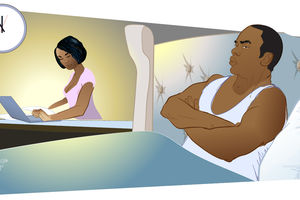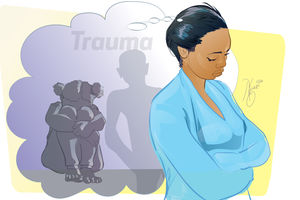
Vaginal looseness and laxity of pelvic muscles are very common.
Daniel, Jackie’s husband, could not stop laughing as she explained her problem. This annoyed Jackie and she threatened to storm out of the consultation room if he kept laughing.
“I’m sorry, please forgive me,” Daniel said amid chuckles.
“These are common problems so nothing to laugh about,” I interjected to bring the situation to order.
The problem Jackie was having was that she felt that her vagina was loose. She used figurative language to explain how she felt.
“I feel that it is no longer a pipe; it feels like a wide basin with paper walls which collapse and cannot maintain their shape,” she said to which I nodded with understanding.
In the recent past, she said, she passed gas through her vagina and occasionally felt that her internal organs were beginning to bulge through it.
“And how is your sex life?” I asked. This made Daniel frown and lean back in his seat. He was uneasy.
“Well, my husband says that occasionally he feels that something is getting in his way,” Jackie said, staring into the horizon and avoiding eye contact with us.
She explained that she no longer enjoyed sex, that there was no good sensation and that, occasionally, it was painful.
“Just say the truth, you have been pushing me away whenever I approach you. You always have excuses,” Daniel said. Jackie did not respond.
The couple, now in their 11th year of marriage and having three children, was having sex twice a month on average. Although Jackie had an orgasm earlier on in her marriage, this had gradually become difficult to achieve. It was three years since her last orgasm.
I examined Jackie and, true to her word, her vaginal walls were lax. The entrance to her vaginal cavity was also wider than normal. Her pelvic muscles were quite loose and could not hold the pressure of supporting the internal organs.
Jackie had a severer form of a problem that affects about a third of women: vaginal looseness and laxity of pelvic muscles. The two problems are not mutually exclusive and tend to co-exist. They are quite common.
Unfortunately, affected women do not talk about it and suffer in silence.
Looseness affects the quality of sex. It makes women feel nothing during sex. A number feel pain because of reduced lubrication. The ability to reach orgasm is reduced too.
In severe cases like Jackie’s, internal organs prolapse and can occlude the vaginal canal, and the man may feel an obstruction during penetrative sex. Further still, affected women may pass gas through the vagina.
A loose vagina sucks air in certain positions and releases it in other positions and there may be a sound when this happens which can be embarrassing. Some women also leak urine if they do not relieve themselves quickly because the looseness affects the ability to hold urine.
“I do not know what happened to my body,” Jackie said, her eyes wetting with tears, “where did I go wrong to deserve this?”
Causes and remedies
Well, the most common cause of a loose vagina is vaginal delivery. When the baby pushes its way out there can be overstretching and if the healing is not complete you end up with a persistent looseness. The more traumatic a delivery, the higher the chances that residual looseness may follow.
Secondly, aging has a way of causing looseness of the vagina and pelvic muscles. It is therefore common for women in menopause to experience weakness. Beyond delivery and aging, there could be trauma as a cause including sexual assault.
Treatment does exist for loose vaginas and pelvic muscles.
A bit of caution is however necessary as some treatments may not help and may cause more problems. An example is the several creams and herbs people insert in their vaginas to cause tightness. There is no clear evidence that these help and in fact they can cause inflammation, scarring and pain.
Uncomplicated looseness improves when pelvic physiotherapy is done. The patient is also taught to do pelvic muscle exercises on their own. A number of scientific studies show that in mild cases, there is marked improvement in tightness of the vagina and that sexual feelings, lubrication and even orgasm return.
Vaginal rejuvenation through lesser, radiofrequency and high-intensity ultrasound are modern ways of treating looseness.
Evidence shows that this group of treatments, also called energy-based treatments, give good results. Unfortunately, these treatments are not easily available in our hospitals.
Severe cases of looseness and prolapse do require surgery. Jackie’s case fell in this category. She needed surgery to tighten, not just the vagina but also pelvic muscles. This was done and, now six months down the line, she is back on course with her sex life and enjoying orgasms.












